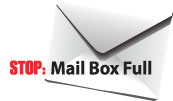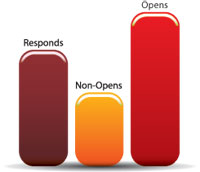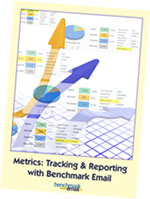
Energy Supply & Services Business Email Marketing Goals
It is critical to note that in order to present the most effective results, your
email newsletter campaign must be specifically engineered to appeal to every type of Energy Supply & Services client, from the casual customers who may only be peripherally aware of your operations to the fully dedicated energy-driven companies and energy-aware consumers who avail themselves of your services and have the potential to evangelize your benefits to a wider online and offline audience. It is necessary to provide the precise type of information that each customer category requires so that when they require your form of energy services, they will turn to your company first.
Implementation
Email marketing for Energy businesses is different from the traditional types of advertising placed in the conventional media such as magazines, newspapers, radio, television and Yellow Page ads. One of the most important differences is how federal and state law is generally applied to email marketing as opposed to traditional advertising: Email marketing is more severely regulated than conventional media formats and the manner by which Energy businesses interact with their email newsletter subscribers is precisely legislated.
Compliance
Every Energy business collecting business cards or some form of physical signup sheets to collect information about their customers is required to state that direct and unequivocal approval has been obtained from the clients prior to placing their email address onto a list.
CAN-SPAM Violations Have Severe Consequences
In the U.S., the primary authority governing all forms of email marketing is administered under the
CAN-SPAM Act, which illustrates criteria on how all email marketers must behave when interacting with the public. The legislation is based on the facilitation of any subscriber to instantly opt out of your list at their primary request. Violations of the CAN-SPAM Act are considered as a clear infringement of federal regulation and could lead to penalties and even long jail terms.
Facilitate Unsubscriptions
As soon as any subscriber informs your Energy business that they want to be taken off of your email newsletter receiver list, federal legislation specifies that they must be deleted from your list irrevocably and immediately. Your Energy business must make sure that the procedure your customer can follow to be taken off your list is easily locatable in every email you send them and simple to use. Failure to honor demands for unsubscriptions constitutes a crime with serious penalties.
Bouncing Email Management
When any Energy business sends out an email, be it a personal message, a business reply or a marketing campaign newsletter, one of three separate things can occur:
It can be delivered correctly.

If your email has bounced you will receive a message from the Mailer Daemon informing you of the situation and explaining reasons for the bounce. If the bounce is soft, the condition occurred after the message left your computer. In cases of a soft bounce it is considered good email practice to attempt to contact the customer through an alternative form of communication in order to inform them that the emails are being returned.
A hard bounce is a more serious problem, as the fault lies with the sender. If you are repeatedly sending emails to an address that is non-existent or blocked for any reason, the various ISPs that route traffic around the internet will place you among the lists of criminal spammers. Being placed on this type of
blacklist has serious consequences for your Energy business, as you may find that you will no longer be able to send out any email marketing missives whatsoever. The boycott may extend to your personal and business emails as well.

Privacy Policy
Some Energy business owners and managers do little more than click onto a competitor's website and copy their privacy policy in order to paste it verbatim onto their own website pages. Not only does this action create a duplicate content that will affect your search engine position in a negative fashion, but it also leaves your business open to potential legal action. To protect your business, your attorney should draft a completely unique and personalized privacy policy that accurately covers the way you do business online.
List Segmentation
Segmentation of an Energy business' email subscription list is by far the best method to hone your online communications strategy based on the demographic and behavior features of your subscribers. The application of segmentation techniques develops email content that precisely fit the wildly differing characteristics of your subscriber base, so you will be able to offer the types of discounts, offers, products, services, equipment and accessories each is most likely to be interested in to suit their energy needs and consumption volumes.
Test Your Email Content
Experienced email marketers are aware of the requirement that they conduct a vigorous and ongoing testing process on their email marketing content. One of the most common tests is called an A/B split test which involves identical content being sent to a particular segment of the subscription list with only a single element changed, such as the
preheader, subject line, image or position of a link. By comparing how these different newsletters perform, you can gain valuable insight into what your Energy business customers are responding to in order to continue to hone your content through further testing.
Obtaining Your Customer's Personal Information
Most Energy business customers are hesistant to divulge personal information about themselves. Many email marketers have discovered that motivating surveys or other types of incentivized polling forms can be a boon in obtaining personal data to base segmentation methodologies on.

Analyze Your Customer's Behavior
The primary method of determining the success of your email marketing campaign is through scrutinizing various
email metric statistics. There are some customers on any subscription list who simply will not open your emails at all, and continuing to send to these subscribers is not likely to modify that type of behavior pattern. These email addresses are best eliminated from your email newsletter list. Other customers may open and read your emails but usually fail to respond to the call to action. These subscribers should not be deleted from the list since they are reading your emails, and that often equates to their eventual response to your Energy business in other ways. The most lucrative category is comprised of the prospects who both read and click through to your landing pages, as these are the customers who are the most responsive from an email marketing perspective, and thus very valuable as online communications recipients.
Good Email Practices
It is important to adhere to good email practices to ensure that you will improve client compliance and maintain the highest level of efficiency while bearing overall positive results at your Energy business' bottom line. Lines, preheaders and subject lines should be meticulously crafted; the differing display abilities between PC and mobile browsers must be accounted for, as well as website landing pages featuring the specific content required to synchronize your A/B split testing efforts and segmentation methods.

Email Metrics
The statistics in this report demonstrate an overwhelming majority of Energy business owners and managers are unaware of their campaigns' click-through rates, while a much smaller number were also unaware of their open rates. While 44 percent were not able to quote their open rates, 87 percent could not state their click-through rates. This failure to comprehend the impact of these basic email metrics when directing an email marketing campaign is a problem that needs to be addressed, especially when it is noted that the differential of nearly double in the rate of open and click-through rate comprehension is a ratio far beyond most industry standard medians. By not understanding the most basic email metrics that are obtained by an online promotional campaign, the Energy business manager or owner denies themselves the overview into the specific factors that indicate how their overall email marketing and promotional campaigns are performing.